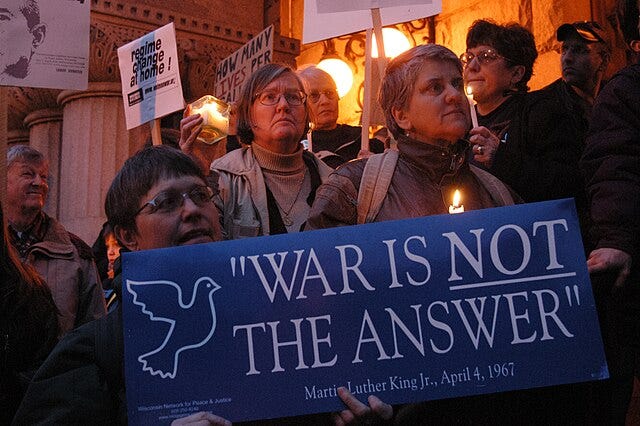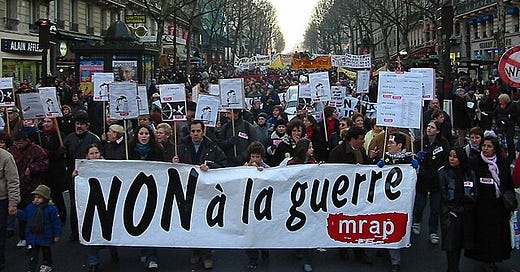Hi all,
Thank you for joining me for today’s song, “Whatever Happened to Peace on Earth” by Willie Nelson (2003).
Comments and questions are welcome. Please be respectful of others’ opinions if they should differ from yours.
If you’d like to hear the song before you read the background, I’ve included a YouTube video below the article. For Japanese students, a glossary of the vocabulary in bold is provided below. TOEFL (PBT) 450+, Eiken 2, CEFR B1.
The Background
(406 words)
In March of 2003, the U.S. and its allies (40 countries* as well as NATO advisers) began sending troops into Iraq in order to “help the Iraqi people to complete the political transition.” The conflict resulted in the overthrow of the government of Saddam Hussein. It also brought control of the large amount of oil under American influence. Having control over oil in Iraq gives the United States a big advantage and a lot of power compared to other countries that need energy from the Middle East. It helps strengthen the U.S. in both economics and politics.
The American public was divided into those who supported the effort to bring down Saddam Hussein and those who believed the purpose of the war was to gain control over the oil fields of Iraq.
Downing Street memo
The Downing Street Memo was a secret document written by UK security members. “Downing Street” is where the British Prime Minister lives. The memo showed that the U.K. and the U.S. had already decided to remove Hussein, and that, in secret from the public, they had looked for reasons (for example, weapons of mass destruction – WMDs) to support this policy of taking the leader of Iraq out of office.
Protest music before and during the Iraq War
There were many songs written to show patriotism in support of the military efforts in Iraq, for example, Lee Greenwood’s God Bless the U.S.A. and Darryl Worley’s Have You Forgotten? Although there were many people in the U.S. who believed Hussein was threatening to use WMDs, there were many others who did not believe the media publicity for the war.
Even before the war started, people around the world organized and began protesting against the invasion of Iraq. Hundreds of thousands marched in protests in major cities such as London, New York, Paris, Berlin, Madrid, and Athens. According to some sources, the demonstration in Rome broke the Guinness Book World Record at about 3 million people.
Along with the protests came the music. Songwriters and musicians in many countries began writing and performing songs against the war. The amount of music in this era was probably more than that written during the Vietnam War. However, listeners did not hear this music on the radio, at least not in the U.S. You had to go on the Internet to find it. Many songs were by famous musicians who allowed them to be downloaded for free.

The Song
(323 words)
In this song, there are several references to passages in the Bible. The first is Peace on earth. In the King James Bible (Luke 2:14), it says, “Glory to God in the highest, and on earth peace, good will toward men.”
There’s so many things going on in the world
Babies dying
Mothers crying
How much oil is one human life worth
And what ever happened to peace on earth
In the next part, there is another reference to the Bible, one of the Ten Commandments which is “You (thou) shall not kill.”
We believe everything that they tell us
They’re gonna’ kill us
So we gotta' kill them first
But I remember a commandment
Thou shall not kill
How much is that soldier’s life worth
And whatever happened to peace on earth
In the chorus of the song, Willie Nelson talks about being lied to. He is saying that the TV newscasters do not tell the whole truth to the people, but the people believe what they are told.
Chorus
And the bewildered herd is still believing
Everything we’ve been told from our birth
Hell, they won’t lie to me
Not on my own damn TV
But how much is a liar’s word worth, meaning you cannot believe - or trust - someone who lies.
And whatever happened to peace on earth
The following Biblical reference is Act toward others in the way you would like them to act toward you. However, here, Nelson is being somewhat sarcastic and suggests that it is better to attack others before they can attack you. The phrase “kill them all and let God sort them out” is a motto that can sometimes be read on T-shirts worn while off duty by U.S. soldiers (Trouillon).
So I guess it’s just
Do unto others before they do it to you
Let’s just kill them all and let God sort them out
Is this what God wants us to do?
QUESTION
Have you ever wondered if someone was telling you the truth or not?
VOCABULARY
adviser 顧問
political transition 政治的移行
overthrow 打倒
influence 影響
weapons of mass destruction 大量破壊兵器
patriotism 愛国心
threaten 脅かす
invasion 侵入
bewildered うろたえる
herd 群れ
sarcastic 皮肉
NOTES:
*For a list of the countries, see: https://en.wikipedia.org/wiki/Multi-National_Force_%E2%80%93_Iraq#:~:text=The%20Multi%2DNational%20Force%20%E2%80%93%20Iraq,Italy%20(Operation%20Ancient%20Babylon)%2C
SOURCES
Arnove, A. (2007). Iraq: The logic of withdrawal. Metropolitan Books.
Ryan, G. (2022, November 2). The Catholic history behind “Kill them all and let god sort them out.” uCatholic. https://ucatholic.com/blog/the-catholic-history-behind-kill-them-all-and-let-god-sort-them-out/
Trouillon, J.-L. (1970, January 1). Chapitre 4. Langue de spécialité et culture de Spécialité. L’exemple de l’anglais des forces armées. Approches de l’anglais de spécialité - Chapitre 4. Langue de spécialité et culture de spécialité. L’exemple de l’anglais des forces armées. https://books.openedition.org/pupvd/1424?lang=en “Kill them all, let God sort them out”, a motto that can sometimes be read on T -shirts worn while off duty by Marines or Special Forces soldiers. (See Note 22 at the end of the chapter.)







Insightful article. Thanks for sharing.
It just shows that in many ways, music can be really influential in terms of spreading awareness and as a way of expressing our strong emotions.
What a great way of teaching history! Thanks for a relevant post and song.